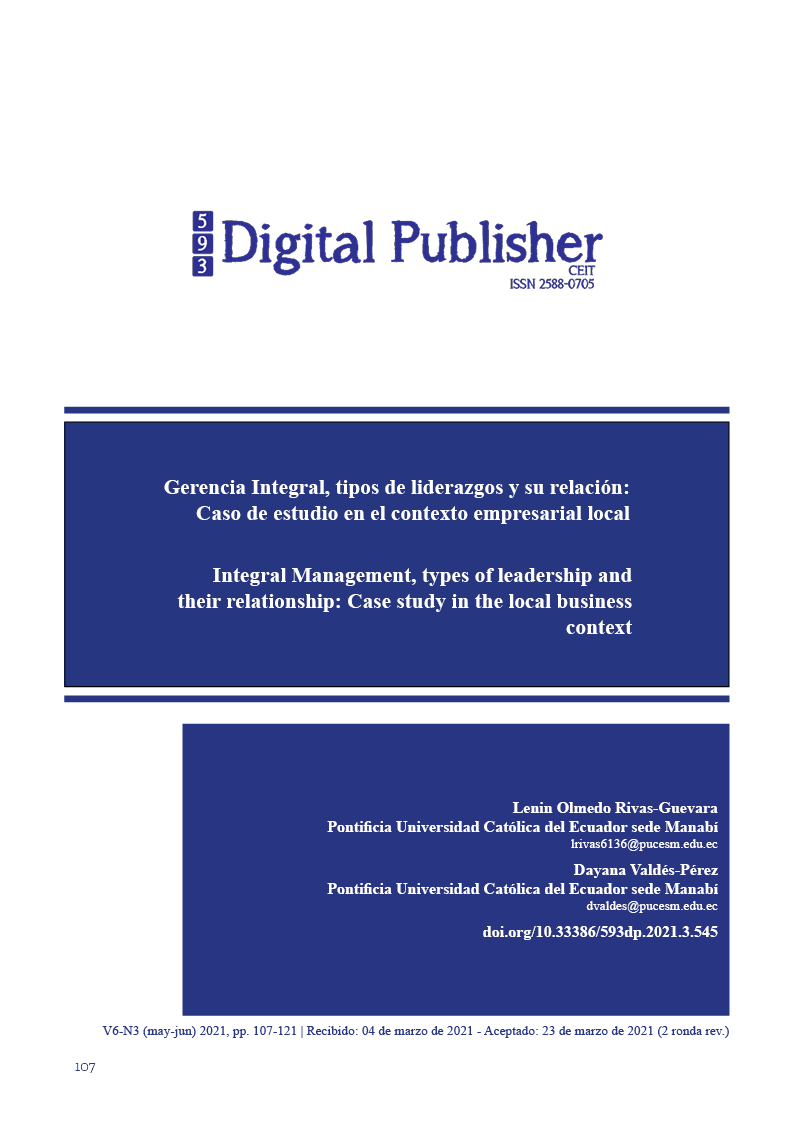Gerencia Integral, tipos de liderazgos y su relación: Caso de estudio en el contexto empresarial local
Contenido principal del artículo
Resumen
La importancia de las acciones administrativas, el liderazgo y su relación en el contexto empresarial ha sido revisada desde muchos enfoques; este estudio de caso centró su interés en determinar la relación e intensidad de las variables gerencia integral, tipos de liderazgo y las herramientas que se pueden utilizar para visibilizarlas, medirlas y tomar acciones sobre ellas. La investigación tuvo un enfoque mixto de tipo descriptiva-correlacional, donde se emplearon técnicas como las encuestas y la estadística descriptiva para determinar los niveles de correlación, confiabilidad y correspondencia entre las variables.
El estudio de caso se desarrolló en la ciudad de Manta, perteneciente a la provincia Manabí- Ecuador, donde converge el puerto pesquero atunero del Pacífico Sur, se realizaron 12 observaciones de grandes empresas del sector industrial, financiero, automotriz y empresas públicas, tres de cada rama. Los resultados obtenidos mediante el análisis de las técnicas aplicadas permitieron demostrar que las acciones administrativas y los tipos de gerencia no solamente guardan relación, sino que deben ser analizados por la alta dirección. No es suficiente conocer las condiciones internas y externas de una organización, así como la implementación de adecuadas herramientas de control de procesos y funciones, pues los resultados de cada empresa, en última instancia, dependen del perfil y aptitudes de la persona que dispone los lineamientos de acción, en este sentido se puede afirmar que las cualidades del líder influyen directamente en los resultados de las organizaciones.
Descargas
Detalles del artículo

Esta obra está bajo una licencia internacional Creative Commons Atribución-NoComercial-CompartirIgual 4.0.
1. Derechos de autor
Las obras que se publican en 593 Digital Publisher CEIT están sujetas a los siguientes términos:
1.1. 593 Digital Publisher CEIT, conserva los derechos patrimoniales (copyright) de las obras publicadas, favorece y permite la reutilización de las mismas bajo la licencia Licencia Creative Commons 4.0 de Reconocimiento-NoComercial-CompartirIgual 4.0, por lo cual se pueden copiar, usar, difundir, transmitir y exponer públicamente, siempre que:
1.1.a. Se cite la autoría y fuente original de su publicación (revista, editorial, URL).
1.1.b. No se usen para fines comerciales u onerosos.
1.1.c. Se mencione la existencia y especificaciones de esta licencia de uso.
Citas
Amigo, A. C. (10 de 2020). La trascendencia empresarial post pandemia “construyamos una compañía que la sociedad quiera que exista”. Revista Informes de Investigación IIATA Nro.5, 35. Obtenido de http://hdl.handle.net/2133/19122
Ayoub, J. L. (2011). Estilos de liderazgo y su eficacia en la administración pública mexicana. México D.F.: Libri Mundi. Obtenido de https://www.amazon.com.mx/Estilos-Liderazgo-Eficacia-Administracion-Mexicana/dp/0557851084
Bass, B. M., & Avolio, B. J. (1994). Improving Organizational Effectiveness Through Transformational Leadership. (M. M. McCue, Ed.) United States of America: SAGE PUBLICATION INC. Obtenido de https://books.google.com.ec/books/about/Improving_Organizational_Effectiveness_T.html?id=_z3_BOVYK-IC&redir_esc=y
Blake, R., & Mouton, J. (1964). The Managerial Grid. Houston: Gulf Publishing Company. Obtenido de https://archive.org/details/managerialgridke00blak
Bracho, O., & García, J. (Enero de 2013). Algunas consideraciones teóricas sobre el liderazgo transformacional. TELOS. Revista de Estudios Interdisciplinarios en Ciencias Sociales, 15(2), 165-177. Recuperado el 18 de marzo de 2021, de https://dialnet.unirioja.es/servlet/articulo?codigo=4451074#:~:text=%20Algunas%20consideraciones%20te%C3%B3ricas%20sobre%20el%20liderazgo%20transformacional,Leadership%205%20EnlacesTexto%20completo%20(%20pdf)%20More
Chiavenato, I. (2001). ADMINISTRACIÓN DE RECURSOS HUMANOS (QUINTA ed.). Santa Fé de Bogotá : McGraw Hill. Obtenido de https://cucjonline.com/biblioteca/files/original/f37a438c7c5cd9b3e4cd837c3168cbc6.pdf
Contreras, F., & Barbosa, D. (Mayo-Agosto de 2013). Del liderazgo transaccional al liderazgo transformacional: implicaciones para el cambio organizacional. Revista Virtual Universidad Católica del Norte(39), 152-164. Obtenido de https://www.redalyc.org/pdf/1942/194227509013.pdf
Franco, A., Reyes, M., & Cuadrado, S. (2017). Incidencia de los Estilos de Liderazgo en la Satisfacción de Colaboradores en Empresas de Servicios de Ecuador. PODIUM, 41 - 64. Obtenido de https://revistas.uees.edu.ec/index.php/Podium/article/view/73
García Solarte, M. (2015). Formulación de un modelo de liderazgo desde las teorías organizacionales. 11(1). Recuperado el 22 de marzo de 2021, de Disponible en: https://www.redalyc.org/articulo.oa?id=265440664005
Hackman, M., & Johnson, C. (2013). LEADERSHIP A communication perspective (Sixth ed.). Illinois: Waveland Press Inc. Obtenido de https://digitalcommons.georgefox.edu/gfsb/54/
INSTITUTO NACIONAL DE ESTADÍSTICAS Y CENSOS. (2019). CENSO NACIONAL ECONÓMICO. Recuperado el 18 de marzo de 2021, de Principales Datos por Ciudades: https://www.ecuadorencifras.gob.ec/censo-nacional-economico/
Lupano, M., & Castro, A. (2006). Estudios sobre el liderazgo. Teorías y evaluacion . ResearchGate, 107-122. doi:10.18682/pd.v6i0.444
Marín Idárraga, D. A. (2012). Estructura organizacional y sus parámetros de diseño: análisis descriptivo en pymes industriales de Bogotá. Estudios Gerenciales, 28(123), 43-63. Recuperado el 18 de abril de 2021
Mora Riapira, E. H. (2015). Planificación estratégica y niveles de competitividad de las Mipymes del sector comercio en Bogotá. Estudios Gerenciales, 31(134). Recuperado el 23 de marzo de 2021, de https://www.redalyc.org/articulo.oa?id=21233043009
Reyes Hernández, J. &. (2019). La cultura organizacional: principales desafíos teóricos y metodológicos para su estudio. Estudios del Desarrollo Social: Cuba y América Latina, 7(1). Recuperado el 13 de marzo de 2021, de http://scielo.sld.cu/scielo.php?script=sci_arttext&pid=S2308-01322019000100201&lng=es&tlng=es.
Robbins, S., & M, C. (2002). Administración . Mexico: PEARSON EDUCACIÓN. Obtenido de https://www.academia.edu/10380934/Administracion_8va_Edicion_Stephen_P_Robbins_y_Mary_Coulter
Sallenave, J. P. (2002). LA GERENCIA INTEGRAL. BARCELONA: GRUPO EDITORIAL NORMA. Obtenido de https://www.academia.edu/22755568/JEAN_PAUL_SALLENAVE_LA_GERENCIA_INTEGRAL
Stoner, J., Freeman, R., & Gilbert, D. (1996). ADMINISTRACIÓN 6ta Edición. Mexico: Prentice-Hall Inc. Obtenido de https://www.academia.edu/35973726/Stoner_1996_Administraci%C3%B3n_6ta_Edici%C3%B3n_J_A_F_Stoner_R_E_Freeman_and_D_R_Gilbert_Jr_ByPriale_FL
Velazco, C. A., Viteri, C. S., & Guayta-Toapanta, N. A. (2018). Emprendimiento y Gerencia Integral en los nuevos tiempos. Polo del conocimiento, 40-51. Obtenido de https://polodelconocimiento.com/ojs/index.php/es/article/view/503



